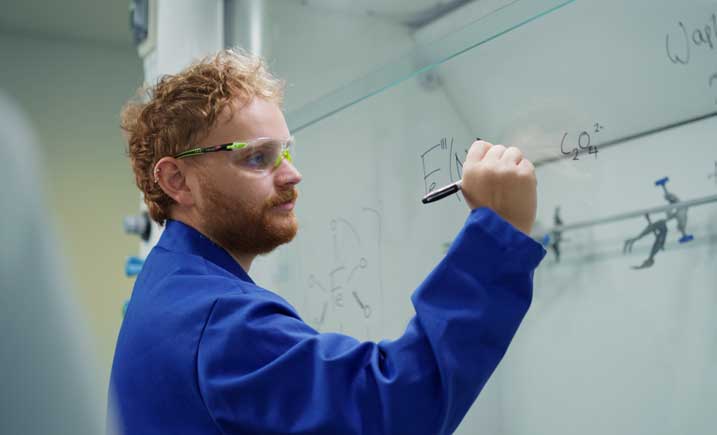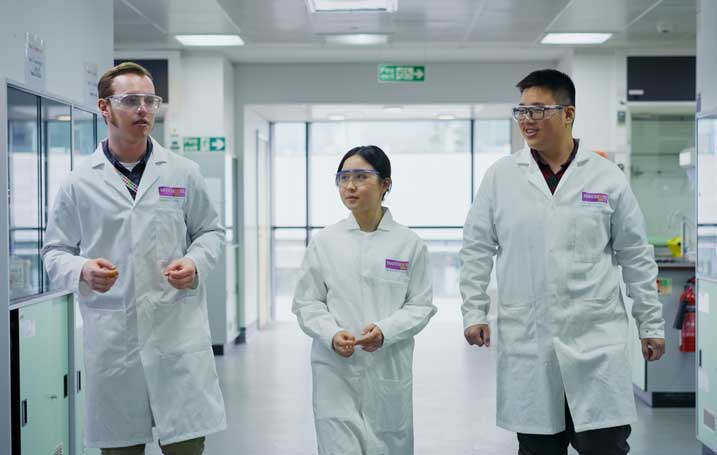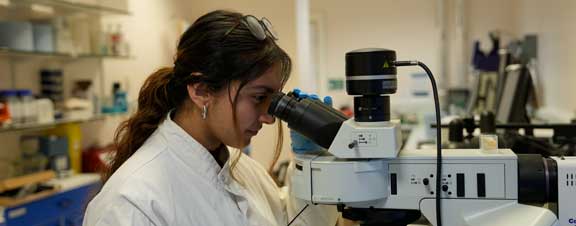Why an MSc in Chemistry
A broad grounding
From medicines to materials and fuels to food, Chemistry as a discipline focuses on the tiny world of molecules with a big impact. Our master's degree in Chemistry at Manchester explores contemporary topics in the diverse fields of the modern discipline.
- Through a grounding in the foundations of synthetic, analytical, organic and inorganic Chemistry you will not just gain knowledge of the subject, but also a range of transferable skills.
- Strengthen your numerical, investigative and problem-solving skills as you train as a natural scientist and prepare for a career in a number of industries.
Master’s course
Our degree
Study a chemistry degree in the world's first industrial city and let your career in chemistry expand.
How you’ll learn
Practical and theoretical learning
You'll take six taught modules worth a total of 90 credits at the start of the course, designed to cover all areas of chemistry at core and advanced levels.
In your third semester you will complete a research project based in a research group within the department. This gives you the chance to apply what you've learnt in a structured way that demonstrates your problem solving and clear communication skills.

Why Manchester?
The birthplace of modern chemistry
Since John Dalton published his work on atomic theory in Manchester, the city we call home has had a long tradition of pushing chemistry's boundaries.
Today the University is home to one of the largest chemistry departments in the UK, with over 80 academics working across the diverse disciplines that make up the modern subject.
Wherever your passion takes you, there will be an expert to help you find your path.

Research excellence
Our Department is ranked seventh in the UK for the quality of our research and third for research power in the latest REF assessment (2021). This translates into world-leading teaching for our students.

Facilities
We're home to large national institutes where researchers work across disciplines, such as the Manchester Institute of Biotechnology, the Photon Science Institute and the Dalton Nuclear Institute.

Careers
Where our MScs can take you
This MSc is a great opportunity for you to prepare for further study in chemistry, and many of our graduates go on to become researchers in academia and industry. With the strong foundations across a broad range of the subject, companies that our alumni have gone on to work at include:
- Unilever
- GlaxoSmithKline
- AstraZeneca
- University of Oxford
- Pearson Publishing.
Supporting you
At Manchester, we don’t just teach you — we support you in planning your future from day one. You’ll have the access to our award winning careers service.
Your careers advisors have put together a guide to preparing for your study at Manchester, and how to make the most of your time here.
How to apply
Apply for our Chemistry MSc course
If you’re interested in applying to the Chemistry taught master's at Manchester, here’s what you need to know.
Contact us
Have any questions? Get in touch
Department of Chemistry Postgraduate Admissions:
- Tel: +44 (0)161 306 0888
- Email: pgt.chemistry@manchester.ac.uk
